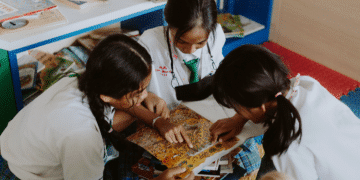Transforming Tomorrow: South Africa’s Ambitious Plan to Revolutionize Early Years Education
The Literacy Crisis in South Africa
Struggles in Reading Proficiency
The statistics are alarming: over 80% of South African 10-year-olds cannot read for meaning.
This heartbreaking reality places South Africa at the lowest rank among 43 surveyed countries, including some with significantly lower income levels like Egypt and Iran.
Despite achieving impressive nearly universal primary school enrollment at 98%, educational quality remains a glaring concern, especially in the critical area of literacy.
Legacy of Segregated Schooling
Apartheid has left a long shadow over South Africa’s education system.
The legacy includes deeply segregated school systems that were intentionally designed to disadvantage black students.
Since the end of apartheid, the government’s efforts have been mostly directed towards merging these segregated systems and expanding access.
While this has resulted in high enrollment rates, the system still grapples with significant disparities in educational quality.
Access Versus Quality
The South African government has made strides in ensuring that nearly all children have access to education, but this achievement doesn’t necessarily translate into quality learning experiences.
High enrollment figures mask the systemic issues that lead to poor educational outcomes, notably in reading and comprehension.
Many students, despite being in school, are not adequately equipped with the fundamental skills needed for academic success and further development.
Government Interventions
Recognizing the critical need for early intervention, the government has introduced mandatory Grade R for children aged five to six.
This move aims to lay a solid foundation for literacy and numeracy from an early stage, addressing these issues before they exacerbate during later school years.
Additionally, early learning centers are being transferred from the department of social development to the department of basic education.
This shift is designed to streamline and enhance the focus on educational outcomes in the early years.
Immediate Attention Required
Despite these strategic efforts, significant challenges remain.
The quality of education is hampered by overcrowded classrooms, underqualified teachers, and inadequate resources.
There’s a pressing need to not only increase access to education but also ensure that this access translates into meaningful learning and development for all students.
Improving the quality of early childhood education is critical for addressing the literacy crisis.
By focusing on a holistic approach that includes enhancing infrastructure, streamlining the management of early learning centers, and investing in teacher training, South Africa can begin to address these long-standing issues.
The government’s ambitious plans for education reform will encounter numerous implementation challenges.
These will need to be addressed to ensure that every child not only attends school but also gains the skills necessary to thrive academically and in life.

The Government’s New Education Strategy
Introduction of Mandatory Grade R for Five- to Six-Year-Olds
South Africa’s government is taking a bold step in its quest to combat the literacy crisis by introducing mandatory Grade R for children aged five to six.
This legislative addition is foundational, ensuring that children are equipped with essential literacy and numeracy skills from an early age.
Research indicates that if children do not master these critical skills early, they struggle to catch up, resulting in poor academic performance across all subjects.
Making Grade R mandatory is part of a broader effort to raise the quality of education countrywide.
This additional year of compulsory education aims to prepare children for the demands of primary school, setting a strong academic foundation and attempting to rectify the low literacy rates that plague the nation’s youth.
Transfer of Early Learning Centers
Another significant aspect of the government’s new strategy involves the transfer of early learning centers from the Department of Social Development to the Department of Basic Education.
The rationale behind this move is clear: while the Department of Social Development has done an admirable job focusing on early childhood development from a health and social protection perspective, it hasn’t been enough to address educational gaps.
This transfer will align early childhood education more closely with the school system’s goals, providing a seamless transition for children as they progress through the educational stages.
Emphasizing education in early learning centers can help rectify the learning gaps and ensure children are better prepared when they enter school.
Ambitious Plan to Register and Regulate 10,000 Creches
To further enhance the quality and regulation of early childhood education, the government has embarked on an ambitious plan to register and regulate 10,000 creches nationwide.
This move is crucial in standardizing the quality of education these centers offer.
Currently, many of these early learning centers operate as small community-run businesses, which often face challenges related to funding, infrastructure, and formal regulation.
By registering and regulating these creches, the government aims to provide better support and oversight, ensuring children receive consistent and high-quality early education.
Implementing these sweeping changes is not without its challenges.
Significant funding requirements for new infrastructure, retaining qualified teachers, and navigating complex registration processes are hurdles that must be overcome.
There is also a pressing need for better coordination between the departments of education and social development to ensure the holistic growth of children.
By addressing these foundational issues, South Africa can create an environment where children have the tools they need to succeed from the earliest stages of their education.
| Key Focus | Before Community Initiatives | After Community Initiatives |
|---|---|---|
| 🏫 Early Learning Centers | Limited access to quality early childhood education in many communities | Rise of community-based centers like Konke Academy, offering affordable early learning opportunities |
| 👩🏫 Female Entrepreneurs | Few women entrepreneurs in the education sector | Women like Faith and Sindi Nedoboni leading educational ventures, driving positive change in early childhood education |
| 💡 Affordability vs. Quality | High-cost education or limited educational opportunities | Affordable education (e.g., 600 rand per month) while maintaining high educational standards |
| 📑 Bureaucratic Challenges | Limited support for registration and obtaining grants for community-run schools | Ongoing struggle to meet regulatory requirements, delaying access to government funding |
| 🌍 Community-Centered Education | A lack of focus on community-driven educational solutions | Community-driven initiatives like Konke Academy, fostering local involvement in education and child development |
Challenges and Implementation Hurdles
Funding for Infrastructure and Teacher Retention
South Africa’s ambitious plans to bolster early childhood education are hindered significantly by funding constraints.
Extending compulsory Grade R across the nation requires substantial investment, particularly for infrastructure and teacher salaries.
The proposed cost to bring new facilities up to standard sits at a staggering 17 billion rand, a figure illustrating the financial burden of this initiative.
Meanwhile, retaining qualified teachers demands an additional 19.1 billion rand over the next three years, a budgetary allocation that remains uncertain amid fiscal challenges.
Bureaucratic Red Tape
Early learning centers face a labyrinth of bureaucratic requirements that often delay their establishment and operation.
For many, particularly those led by community entrepreneurs, the challenge lies in navigating complex registration processes.
For instance, acquiring funding to provide meals at these centers requires submitting extensive documentation—an overwhelming task even for the most informed individuals.
This bureaucratic overload can deter prospective educators, diminishing the potential reach of quality early years education.
Coordination Between Departments
Coordination between the Department of Basic Education and the Department of Social Development is crucial for the seamless delivery of services.
The recent transfer of early learning centers to the education department highlights the necessity of synergy between these entities.
Historically, the focus of social development skewed towards health and social protection, often leaving educational aspects underemphasized.
However, the current transition aims to rectify this by centering literacy and numeracy within early childhood programs.
Transitioning into the future requires more than financial investments; it demands a unified approach to tackle the multifaceted barriers inhibiting progress.
As South Africa grapples with these impediments, the integration of health, wealth, and education initiatives signal a cogent path to supporting the nation’s youngest citizens.
The Path Forward
As South Africa grapples with a severe literacy crisis, it is imperative to adopt a holistic approach that integrates literacy, numeracy, and nutrition to ensure comprehensive child development.
A Holistic Approach
Focusing solely on literacy and numeracy is not enough.
Effective education reform must also consider the physical and emotional well-being of children.
Nutrition plays a crucial role in cognitive development. Studies indicate that cannot be understood in isolation.
Proper nutrition from prenatal stages is vital. A mother’s nutritional intake directly impacts the child’s development.
Without proper nutrition, children risk cognitive impairments that hinder their learning process.
Supporting Families
Recognizing the role of poverty in learning barriers, the government has proposed increases in the.
Currently, the grant stands at 530 rand per month.
Advocates urge raising it to 796 rand, matching the cost of 2,100 calories worth of food per day. This increase addresses immediate nutritional needs and supports long-term educational outcomes.
Investment in Early Years Education
Strategic investments in early education are critical. Extending Grade R to all children and improving early learning centers require significant funding.
An estimated 17 billion rand is needed to build new facilities and upgrade existing ones.
Furthermore, 19.1 billion rand over three years is necessary to retain 11,000 teachers, and an additional 10 billion rand is allocated for early childhood development initiatives, including Grade R.
Implementation and Beyond
Efficient coordination between the Department of Basic Education and other governmental and non-governmental bodies is critical.
Streamlining registration processes and reducing bureaucratic barriers can enhance the impact of educational reforms.
These strategies will create a conducive environment for holistic child development.
By integrating literacy, numeracy, and nutrition, and ensuring children have the support they need, South Africa can begin to break the cycle of educational inequality.
The focus on early years will lay a foundation for a brighter future, nurturing not just educated individuals but well-rounded citizens who can contribute meaningfully to society.





